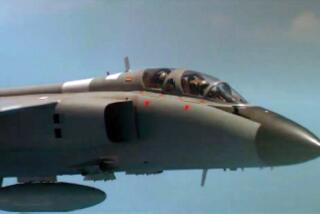Deng Links U.S. to China’s Unrest in June : Diplomacy: The Chinese leader tells Nixon that Beijing was the victim. He says Washington now should take the initiative to restore friendly ties.
BEIJING — Chinese leader Deng Xiaoping, in a meeting Tuesday with former President Richard M. Nixon, accused the United States of deep involvement in last spring’s pro-democracy protest in Beijing, the official New China News Agency reported.
Deng insisted that it is up to the United States, not China, to take the first steps toward restoring more friendly relations.
“Frankly speaking, the United States was involved too deeply in the turmoil and counterrevolutionary rebellion which occurred in Beijing not long ago,” Deng reportedly told Nixon in a 95-minute meeting at the Great Hall of the People. “China was the real victim, and it is unjust to reprove China for it.
“We hope that China and the United States will solve as soon as possible the problems in their relations and will create a sound basis on which to promote future ties. However, it is up to the United States to take the initiative.”
It was not immediately clear whether Deng’s words were intended primarily for domestic consumption or whether they might mark a further deterioration in Sino-U.S. relations.
U.S. Envoys Harassed
In the past few days, there has been a marked increase in harassment of U.S. diplomats in Beijing. A few paramilitary policemen armed with semiautomatic weapons have stood guard outside the main U.S. Embassy compound and Ambassador James R. Lilley’s residence all summer and fall. In one of the compounds, the United States is providing refuge to China’s most prominent dissident, the astrophysicist Fang Lizhi, and his wife.
Since late last week, the guard has been increased by a dozen or more additional Chinese, some in uniform and some in civilian clothes, who stand near the entrances and cast unfriendly looks at visitors.
An unidentified U.S. diplomat told the Associated Press that twice in the past week, paramilitary guards have pointed automatic weapons at children of U.S. diplomats and pulled the trigger. In neither case was the gun loaded.
In seven other recent incidents, tires have been slashed on the cars of U.S. diplomats, and the headlights turned on so as to discharge the batteries, the diplomat said.
The embassy has protested verbally to the Chinese government three times since late last week.
Since mid-June, Chinese media have used edited videotapes and misleading publications to portray the massacre on the night of last June 3-4 as a response to--rather than the cause of--the rioting that took place in Beijing the following day. Hundreds, perhaps thousands, of students and other people were killed when the army shot its way into Beijing in the pre-dawn hours of June 4 to retake control of Tian An Men Square from student demonstrators.
Nixon, in his comments to Deng, warned the 85-year-old leader that in the 17 years since his 1972 visit to Beijing, “there has never been a more difficult crisis” in relations between the United States and China. He warned Deng that many Americans with long records of friendship are turning against his government.
Friends Concerned
“This time the concerns developed not from those who are foes of China but from those who are friends of China,” Nixon said.
Something must be done, he said, to “repair the damage that has been done to the respect in the United States among China’s friends for some of China’s leaders.”
Deng appeared to dismiss such concerns.
“We can never forget state sovereignty and national honor,” he was quoted as saying, “nor can we do away with national self-respect. China will not allow any country to interfere in its internal affairs.”
Nixon met later in the day with Jiang Zemin, who in late June replaced Zhao Ziyang as general secretary of the Communist Party. The news agency said Jiang “reassured Nixon that the opened door of China will not be closed again.”
“We will not just pay lip service to upholding reform and the open policy,” Jiang said, “but we will also take down-to-earth steps, including the implementation of certain major projects and the improvement of relevant laws and regulations.”
Although martial law remains in effect in Beijing, steps are being taken to make it less visible, partly in an attempt to encourage foreigners to return. Armed soldiers who had stood guard at major intersections and highway overpasses for more than four months have now been withdrawn.
In a special military ceremony held shortly before midnight Tuesday, the helmeted soldiers who guarded Tian An Men Square with rifles were replaced by less intimidating paramilitary officers, who wear cloth hats and carry only pistols.
More to Read
Sign up for Essential California
The most important California stories and recommendations in your inbox every morning.
You may occasionally receive promotional content from the Los Angeles Times.









